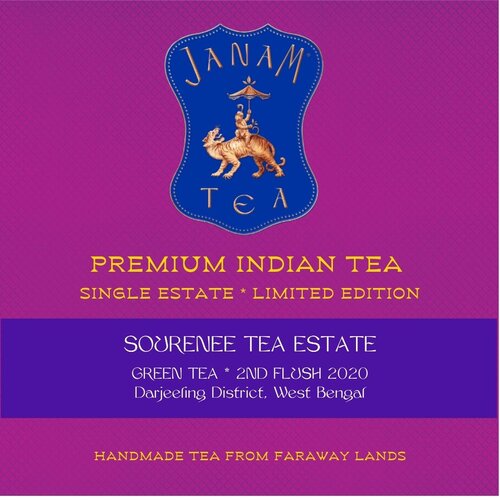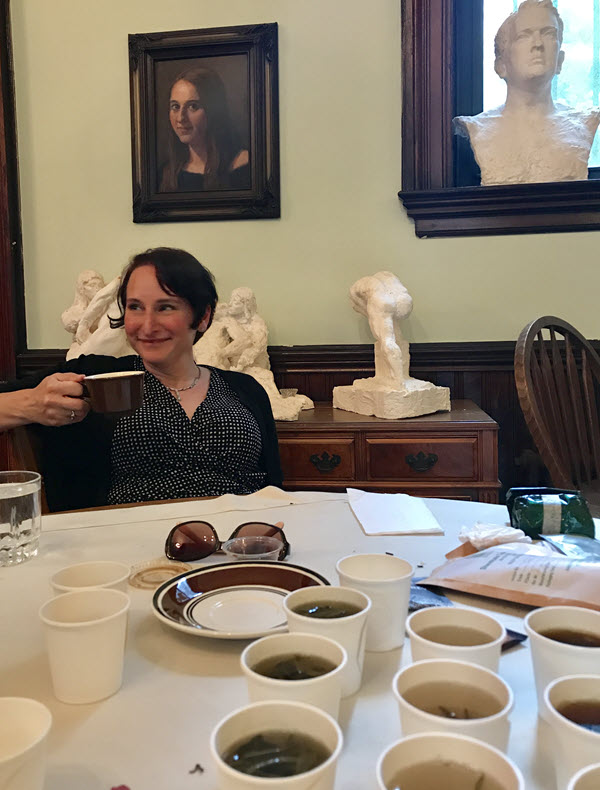Amy Dubin-Nath sees a bright future for specialty teas originating in India, “but I don’t think it is going to be a quick flip where people are only after high end teas.” Instead, the process will be gradual, following a path similar to fine wine. “Do I want to see the spectacular teas of India keep selling at a high price?” she asks, “Yes, definitely, as that elevates the perceived value, making it something precious. I believe that message should be spread throughout the world — including in India.”
Listen to the interview:

India’s Spectacular Specialty Teas
Amy Dubin-Nath established Janam Tea in 2004 to showcase the rich array of teas produced in India, which she experienced firsthand during her self-guided travels. She began developing her palate as a teenager and came to tea appreciation by way of wine and whiskey. In 2005, she opened a tea shop specifically for single-origin Indian teas and in 2016 a tearoom in New York City.
Dan Bolton: Are single-origin whole and broken leaf teas the future?
Amy Dubin-Nath: Oh, that is that is such a fantastic question. I love talking about the future of tea. Because everything is possible in the future, right? When it comes to the future of tea, I see a broader range.
We have tea at every level, the challenge is that we have been exposed as a society to teas of a certain style of a certain grade of a certain color. It creates a certain expectation. If you like Lipton tea, great, drink it, I’m happy for anybody to drink tea, but there are other styles, there are other places that tea comes from, there’s other experiences that you can have.
I think the near term future of Indian tea is in the excitement and curiosity around exploring India’s most spectacular teas. I foresee in the next 15 to 20 years, that people will have more facility with the language of tea and clarity around what they’re buying and be intentional about buying and be able to better discern what they want in the grocery store.
I personally, in my professional experience, do not believe we’re there yet. It’ll take a little bit of time to expand people’s horizons, giving them more choices and some more opportunities to taste fine and specialty teas.
Dan: The new president of packaged tea at Tata Consumer Products in April introduced a premium tea sold exclusively online and marketed exclusively to India’s domestic consumers. Tata’s 1968 tea in 50g tins sells for between 500 and 1500 rupees ($20 US). The company reports that sales grew by 59.6% in value and 23% in volume from January this year.
Amy: The thought that one person has only one tea, and they only drink one tea 10 cups a day their whole life definitely does happen, but more and more people want different flavors, just like preferring to wear red one day or yellow another day. You just want novelty.
However, I don’t know that you can attribute all of that to the desire for tea itself. Sometimes people want the best of the best just because it’s the best. And it doesn’t matter what it is. And sometimes people want something that looks posh, because it’s a really special gift.
You can have the best, most gorgeous packaging in the world, and the best tea in the world, but that tea and the experience of tea are inextricable.
Indians know what tea is, they already have a flavor expectation, they already understand what it is, but when it comes to long leaf, loose leaf tea, and whole leaf tea, most of that has been exported to Western countries.
It’s hard to project success, but 1500 rupees for 50 grams in a handmade, beautiful, gorgeous wrapping, is still a tough sell, even in the highest end retail shopping centres in Delhi and Kolkata.
Do I want them to keep selling at a high price? Yes, definitely because what it does is it elevates the value the perceived value of Indian tea as something that is precious, and it is and I believe that message should be spread throughout the world and including in India.
The sustainability of our industry depends on getting consumers to wake up to the fact that tea is precious. The value should come up, the prices should come up so that our industry, as a whole, can come up.
Dan: Will you discuss the pivot to online by tea retailers and the popularity of suppliers selling direct to consumers and share your expertise in marketing tea.
Amy: So, to share with you a little bit about what’s happening in India in Assam alone there is something like 100,000 small leaf producers.
Now there are also several smaller areas, gardens, where people are making tea and making experimental tea and some fantastic stuff.
People who are producing tea are aware that specialty tea is growing as a concept and that organic tea is growing as a concept. But expecting small growers and small producers to be attuned to the whim and whimsy of Americans in particular, is a pretty big ask.
I would be very surprised to find producers who are rushing to meet the style demands of Americans. They make what they make and they know that their skill and their craftsmanship go into designing the best flavor, the best style for the leaf at that time, and they are trying to get the best prices for it.
Aside from Janam Tea, TEAORB is the only outlet that I am aware of for small Indian growers. Their online marketplace and website is called TEAORB Marketplace. The site guarantees their teas to be fresh, and they get it to consumers, as close to direct to the from the producers as possible. It was established in 2016. There really isn’t anything that is perfect, pervasive, government backed, or the work of large organizations willing to step up to promote the teas from small producers.
So far as I know, in India, TEAORB is ground-breaking. I don’t know of any other marketplace for small growers where you can find hand-rolled teas, dheki (mortar and pestle) teas and phalap (tea of Singphos).

TEAORB Marketplace is a social entrepreneurship startup, working closely with small tea farmers and estates of India by providing a virtual platform in an effort to ensure a fair price for their high quality produce and to uphold the essence of sustainability by addressing real issues affecting people and the environment. ? Founder Jayanta Kakati, former secretary, Guwahati Tea Auction Centre.
Dan: Tell me about your talk next week at World Tea Expo.
Amy: This is going to be a very interesting week for me because I’m speaking at the World Tea Expo and the Global Summit for All Things Food, a completely separate show at the MGM Grand a couple days later.
The World Tea Expo talk is all the things I love about Indian tea Indian tea, I feel has been a little bit underrepresented at World tea Expo, so my goal in going is to share with people how I got into it, how I developed my love for Indian tea over 20 years ago, how and why I changed my life to basically be a de facto brand ambassador for Indian tea in North America.
People don’t realize they’ve been drinking Indian tea. They think of Indian tea as Masala Chai and are unaware that India produces so many different styles and types and varieties.
Amy’s talk at World Tea Expo, Las Vegas, is titled: The Wild Expanse of Indian Tea: Hang on to your Tastebuds! at 1 pm Tuesday, June 29. Two days later at the Global Summit for All Things Food, Amy will accept an award as one of the 100 most influential food and beverage professionals.
This interview has been edited and condensed.

Janam Tea
Amy is now making plans to open her third business selling Indian tea, a tasting lounge and gift salon in Columbus, Ohio. Amy is a tea curator, host of afternoon tea and a tea educator. She offers staff training and consulting services, introduces fine Indian teas to both corporate and private clients through bespoke events (both social and outcome-driven), and creates custom gifts.
? Dan Bolton

[email protected]
800-556-2806
Share this post with your friends in tea.
Signup and receive Tea Biz weekly in your inbox.
Never Miss an Episode
Subscribe wherever you enjoy podcasts:



